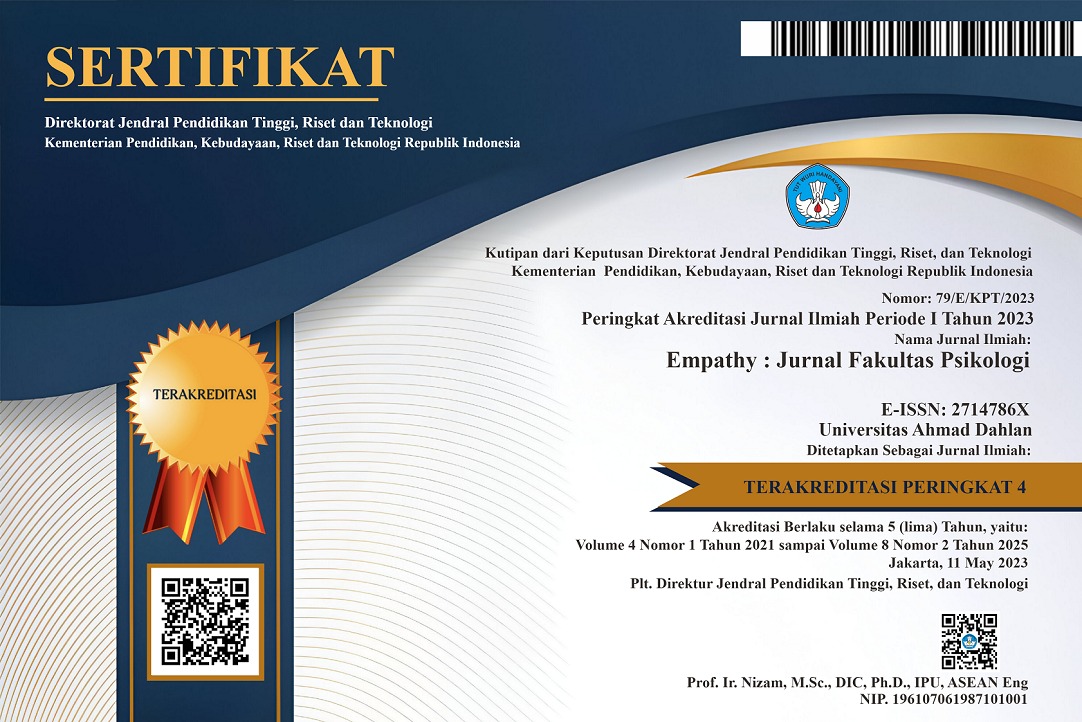Penerimaan Diri Orangtua pada Anak yang Mengalami Retardasi Mental
DOI:
https://doi.org/10.12928/empathy.v4i1.20914Keywords:
Mental retardation, Parents, Self-AcceptanceAbstract
Parental Self-Acceptance in Children with Mental Retardatio
Â
This study aims to see a picture of self-acceptance parents of mentally retarded children. The subjects in this study were parents with mentally retarded children. This study consisted of three subjects with the sampling technique used as criterion sampling where there were criteria in it, namely the age of children 10-17 years with mentally retarded. The method used in this research is a qualitative method with a phenomenological approach. Collecting data in this study were observations and interviews and This study aims to see a picture of self-acceptance parents of mentally retarded children. The subjects in this study were parents with mentally retarded children. This study consisted of three subjects with the sampling technique used as purposive sampling where there were criteria in it, namely the age of children 10-17 years. The method used in this research is a qualitative method with a phenomenological approach. Collecting data in this study were observations and interviews and the data analysis technique used was thematic analysis. Trust in this study uses triangulation of methods. Method triangulation comes from observational data and subject interviews.. The results showed that the three subjects had attitudes a good self-acceptance of the presence of children can be seen from all aspects, such as no rejection, not being ashamed of the child's condition, accepting and making community participation an important life lesson, and the principle of life to continue raising children until the end of their life. Based on the research results it can be concluded that the third subject accepts himself well. This can be seen from the first subject who often invites his children to the market and around the housing complex, the second subject believes that his child is a provision and responsibility from God to him, and the third subject often invites his child to keep in touch with his family.
References
American Psychiatric Association. (1994). DSM IV. Washinton DC: American Psychiatric Association.
American Psychiatric Association. (2013). Diagnostic and Statistical Manual of Mental Disorders, Fifth Edition. Arlington, VA: American Psychiatric Association.
Bandura, A. (1977). Social learning theory. New Jersey: Prentice-Hall, Inc.
Benny. F., Nurdian. A. E., Chundrayetti. E. (2014). Penerimaan ibu yang memiliki anak retardasi mental di SLB YPAC Padang. Jurnal.fk.unand.ac.id.
Brammer, L. M & Shostrom, E. L. (1982). Therapeutic psychology. fundamentals of counseling and psychotherapy. Englewood Cliffs, New Jersey: Prentice-Hall.
Coleridge, P. (1997). Pembahasan dan pembangunan. Yogyakarta: Oxam &LP4C Dria Manunggal dengan Pustaka Pelajar.
Creswell, J. W. (2015). Penelitian Kualitatif & Desain Riset Memilih Diantara Lima Pendekatan. 1st ed. Yogyakarta: Pustaka Pelajar.
Durand, V. M., & Barlow, D. H. (2007). Psikologi abnormal. dalam Soejipto & Soejipto (Penterjemah). Yogyakarta: Pustaka Pelajar.
Ekantari, P. (2010). Hubungan antara kepribadian tangguh dengan stres pengasuhan pada ibu yang memiliki anak retradasi mental. (Skripsi) tidak diterbitkan, Fakultas Psikologi Universitas Muhammadiyah Surakarta, Surakarta.
Garguilo, R.M. (1985). Working with parents of exeptional children: A Guide for Profesionals. Boston: Houghton Mifflin Company.
Hurlock, E. B. (1997). Perkembangan anak. Jakarta: Gramedia.
Hurlock, E. B. (2006). Psikologi perkembangan suatu pendekatan sepanjang rentan kehidupan. Edisi Kelima. Jakarta: Penerbit Erlangga.
Hurlock, E.B. (1991). Psikologi perkembangan suatu pendekatan sepanjang rentan kehidupan. Jakarta: Penerbit Erlangga.
Hurlock. E. B. (1973). Adolescene development. Tokyo: Mograw Inc Hill.
Hurlock. E. B. (1976). Personality development. New Delhi: Tata McGraw-Hill Publishing Company LTD.
Huth, M. L. & Gibby, G.R. (1979). The mentally retarded child. Boston: Allyn and Bacon.
Jersild, A.T. (1978). The Psychology of Adolenscence. New York: Mc Millan Company.
Kemenkes RI (2015) . Profil Kesehatan Indonesia tahun 2014. Jakarta: Kemenkes Republik Indonesia.
Khoirul, H. (2012). Penerimaan diri Orangtua terhadap anak retardasi mentalditinjau dari kelas sosial. Jurnal Developmental and Clinical Psychology, ISSN 2252-6358.
Mangunsong, F. (2011). Psikologi dan pendidikan anak berkebuTuhan khusus. Depok: Lembaga Pengembangan Sarana Pengukuran dan Pendidikan Psikologi (LPSP3) Kampus Baru UI.
Perdana, G. K. A. & Dewi, K. S. (2015). Kebahagiaan pada ibu yang memiliki anak difabel. Jurnal Empati. Vol 4(4). Hal 66-72.
Sari, D. J. & Reza, M. (2013). Hubungan antara dukungan sosial dengan penerimaan diri pada remaja penderita HIV di Surabaya. Program Studi Psikologi Universitas Negeri Surabaya.
Supratiknya, A. (2004). Komunikasi antar pribadi (tinjauan psikologi). Yogyakarta: Kanisius.
Sutikno, D. A (1993). Persepsi tentang penerimaan orangtua, konsep diri, dan prestasi belajar pada remaja tunarungu. (Skripsi) tidak diterbitkan. Fakultas Psikologi Universitas Indonesia. Depok.
Suwarti. (2004). Hubungan antara penerimaan diri dan hubungan interpersonal pada Lanjut Usia. Insight. Tahun II/No.2. Hal 80-89.
Tentama, F. (2010). Hubungan berpikir positif dan penerimaan diri pada remaja penyandang cacat tubuh akibat kecelakaan. Humanitas, 7(1), 66-75.
Undang-undang Nomer 1974 tentangn Perkawinan. Jakarta.
Wahyuningtiyas, D. T. (2016). Kesejatraan psikologis (psychological wel-being) Orangtua dengan anak adhd (attention deficit hyperactive disorder) di Surabaya. (Skripsi). Universitas Islam Negeri Maulana Malik Ibrahim. Malang.
Downloads
Published
Issue
Section
License
Authors who publish with Empathy: Jurnal Fakultas Psikologi agree to the following terms:
- Authors retain copyright and grant the journal right of first publication with the work simultaneously licensed under a Creative Commons Attribution License (CC BY-SA 4.0) that allows others to share the work with an acknowledgment of the work's authorship and initial publication in this journal.
- Authors are able to enter into separate, additional contractual arrangements for the non-exclusive distribution of the journal's published version of the work (e.g., post it to an institutional repository or publish it in a book), with an acknowledgment of its initial publication in this journal.
- Authors are permitted and encouraged to post their work online (e.g., in institutional repositories or on their website) prior to and during the submission process, as it can lead to productive exchanges, as well as earlier and greater citation of published work.

This work is licensed under a Creative Commons Attribution-ShareAlike 4.0 International License.



